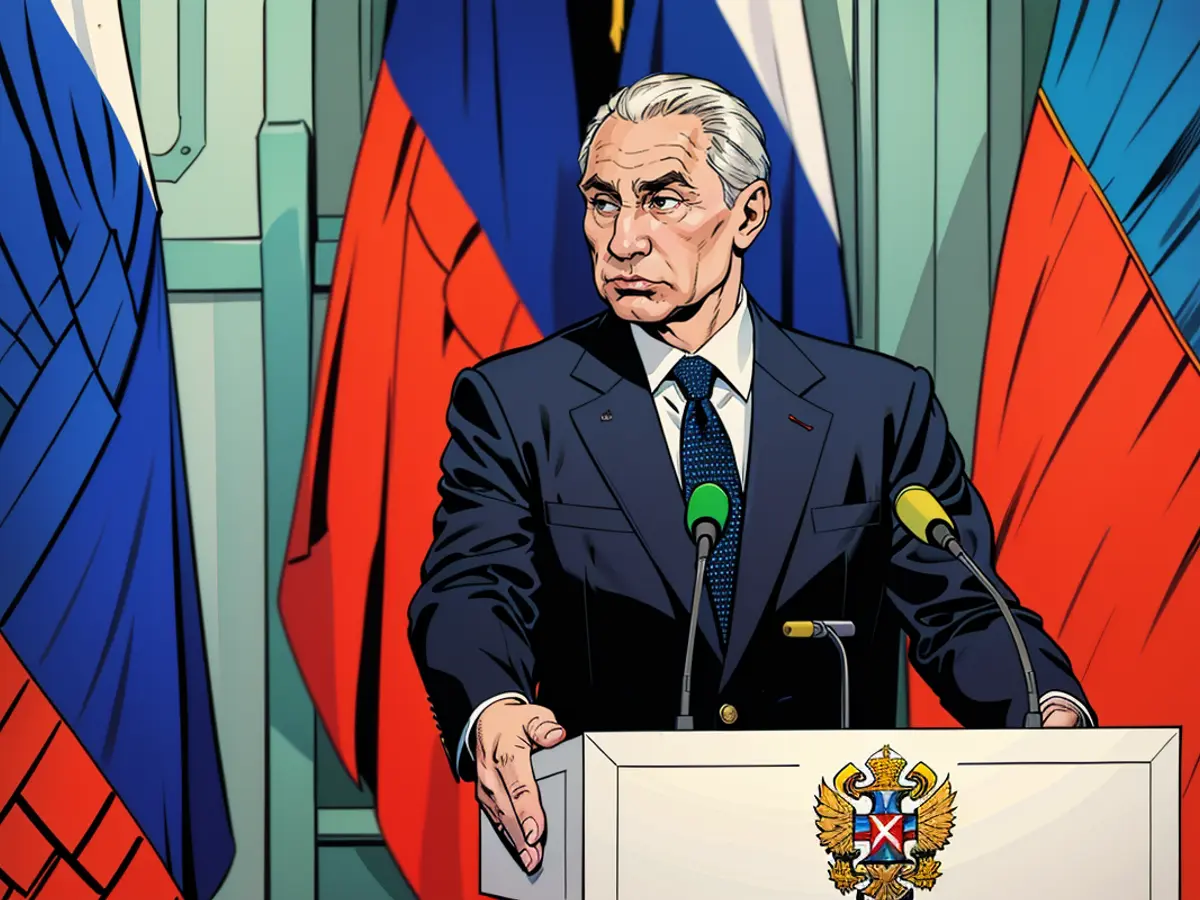Uncovering the unexpected role of prominent conservative social media influencers as unintentional amplifiers of Russian propaganda.
The Justice Department didn't explicitly blame or name the personalities involved, but unsealed court documents revealed on Wednesday that Russian state media producers channeled close to $10 million towards an unnamed Tennessee-based online media firm. This company, as reported by CNN, goes by the name of Tenet Media. Famous for hosting prominent right-wing commentators such as Tim Pool, Benny Johnson, Lauren Southern, Tayler Hansen, Matt Christiansen, and Dave Rubin, Tenet Media boasts a massive following across various social media platforms.
Two employees from Russian state media were charged with conspiring to break the Foreign Agents Registration Act and money laundering. The clandestine payments shed light on some high-profile right-wing personalities who allegedly received millions from the Kremlin without their knowledge, as per the Justice Department. These individuals were used to promote conservative viewpoints that served Russian interests.
The indictment reveals how vulnerable the booming online influencer, podcast, and content creation scene is to infiltration, with creators operating with minimal constraints and transparency.
Tenet Media launched last year, describing itself as a network of heterodox commentators focused on Western political and cultural issues with six key figures, all with established online presences in the conservative media ecosystem. Some, like Tim Pool and Benny Johnson, had previous experience at mainstream media outlets before transitioning into conservative media.
Rubin, who was once known for his libertarian views and worked at progressive network The Young Turks, now hosts "The Rubin Report" on Glenn Beck’s The Blaze as well as YouTube. Others, such as Lauren Southern, gained prominence in the online alt-right and White nationalism spaces (Southern has previously denied being a White nationalist).
The influencers associated with Tenet Media amassed over 6 million YouTube subscribers and their reach extended beyond Google-owned video platforms. Pool, known for his black beanie on live broadcasts, has hosted far-right extremists like Proud Boys leader Enrique Tarrio and Jack Posobiec. Earlier this year, Pool interviewed former President Donald Trump on his podcast.
Johnson, with nearly 2.4 million YouTube subscribers and former chief creative officer at right-wing activist group Turning Point USA, interviewed Donald Trump Jr. on the Tenet platform in February.
The deals between Tenet Media and the influencers varied, with the platform exclusively hosting some shows and cross-posting creators' other content. According to the indictment, one social media star received $400,000 per month to create content for the platform, with another influencer also receiving a $100,000 signing bonus.
Christiansen, who was approached last June by co-founders Lauren Chen and Liam Donovan from Tenet Media to join their network, claimed they could help him gain more visibility for his content. Neither Chen nor Donovan were named in the indictment.
Chen, a right-wing media personality who had over 572,000 subscribers on her YouTube account before it was taken down on Thursday, was fired by Blaze Media the day after the indictment was unsealed by the Justice Department.
Tenet Media representatives did not respond to a request for comment.
Russian narratives on display
The indictment alleges that employees from Russian state media outlet RT financed and guided the company with the intention of tapping into its commentators' large fanbase to exploit divisive narratives that furthered Russian interests. The partnership mainly reinforced the congruity between the Kremlin's views and the company's influencers. Intelligence agencies claim that the Kremlin has sought to bolster Donald Trump's campaign, questioned Western support for Ukraine, and criticized certain aspects of the LGBTQ movement.
The Justice Department stated that the views promoted in the influencer videos served Kremlin interests and narratives, including stoking domestic division and weakening the opposition to Russia's key interests, such as its ongoing conflict in Ukraine.
While Russia and the Republican Party under Trump have grown increasingly aligned in their perspectives, Russia's military actions in Ukraine became a popular topic among Tenet's influencers. For instance, Pool declared on a live stream last month, "Ukraine is the enemy of this country!" and "Ukraine is our enemy, being funded by the Democrats." Additionally, in another instance, Russian funders asked a Tenet co-founder to "blame Ukraine and the United States" for a terrorist attack on a concert hall outside Moscow that resulted in more than 130 deaths. While ISIS claimed responsibility for the attack, Russian President Vladimir Putin implied Ukraine's involvement, a claim Kyiv denied.
On March 23rd, Johnson expressed suspicions about Ukraine's involvement in the attack in a clip uploaded to his private channel, claiming it seemed too convenient for the US to issue terror warnings prior to the incident. It's unclear whether Johnson is referred to as "commentator-3" or if he simply posted a relevant video ahead of time. Johnson has consistently denied any ties to Russian funding and asserted his independence in editorial matters.
In a Saturday evening post, Johnson dismissed any connection between the affairs outlined in the indictment and his show, stating that he never requested coverage, nor addressed the topic on Tenet or any other platform afterwards.
Propaganda pushed by the monetized influencers aligned with the Kremlin's agenda, such as fear-mongering about migrant gangs and promoting Trump, who US intelligence agencies considered to be Russia's preferred candidate in the 2020 election.
In 2022, Pool voiced concerns about a mass shooting at a Colorado LGBTQ nightclub where a man took five lives and hurt 19 others, attributing the club's "all ages drag brunch" to supporting "grooming children."
"We should not tolerate pedophiles grooming children," Pool wrote, formerly known as Twitter. "Club Q had a grooming event. How do we prevent the violence and stop the grooming?"
The idea that LGBTQ individuals are pedophiles or groomers is an extreme, homophobic conspiracy theory commonly used to justify anti-LGBTQ policies in extreme right-wing circles.
Later that same month, Rubin attacked Canadian Prime Minister Justin Trudeau, who called Putin a "monster," following Trudeau's urging of Israel to show restraint in their military conflict against Hamas after the October 7 attack.
Rubin referred to Trudeau as a "evil communist piece of sh–," encouraging him to "just come out of the closet already," neither of which is accurate.
The Justice Department stated that the commentators were unaware of the Russian funding source and were informed that a fake European investor named Eduard Grigoriann was behind the payments.
"In truth and fact," the indictment reads, "Grigoriann was a fictional persona."
Following the indictment's unveiling, the Tenet influencers who have come forward have all acknowledged their lack of awareness of the Russian funding and described themselves as victims of the scheme.
"At no point did anyone other than myself have complete control over the show, and the program's content is often devoid of political bias," Pool claimed.
At least three of the commentators reported being contacted by the FBI for voluntary interviews in potential relation to the crime.
"Overt shilling"
The Russians persuaded Tenet to promote popular viral videos, according to the indictment. In one instance, Tenet staff was requested to repost a video of a renowned U.S. political commentator believed to be Tucker Carlson, who praised his grocery shopping experience in Russia.
"It just appears like overt shilling," noted "Producer-1" in an internal communication to one of the company's founders, as reported in the indictment.
However, under pressure from a company founder, the producer eventually obliged, scheduled to repost the video the following day, the indictment stated.
"Information laundering is so insidious," disinformation expert Nina Jankowicz, co-founder of the American Sunlight Project, commented. "These individuals are motivated by their bottom line, so they post inflammatory content to gather views and likes, satisfying their 'producers.'"
"These individuals are not conducting thorough background checks on their sponsors, and millions of Americans are relying on them for unfiltered news," she added.
Tenet Media has yet to respond to inquiries and ceased posting content on Wednesday. One of the company's listed talent, Tayler Hansen, declared via post on Thursday, "TENET Media has ceased operations after the DOJ indictment."
Russia's perpetual influence operations
The Russian government has a long history of exploiting Americans in disinformation and influence campaigns aimed at fueling divisions within the US and promoting Russia's interests.
In recent years, Russia has successfully exploited social media and the internet's anonymity to infiltrate both right-wing and left-wing American social movements. The infiltration typically involved real Americans working unknowingly in collaboration with Russian agents.
Following the 2016 U.S. presidential election, congressional and federal investigations revealed that Russia successfully utilized unwitting Americans to stage protests, manage social media accounts, and host events on their behalf.
"Well-resourced state actors utilize both broadcast and social media across various levels of transparency," wrote Renee DiResta, a former research manager at the Stanford Internet Observatory and author of the book "Invisible Rulers: The People Who Turn Lies Into Reality."
"Several strategies Russia is employing concurrently; as one strategy becomes less effective or more expensive, they adopt other strategies," DiResta added. "This situation is essentially a form of front media operation - an age-old approach, although the most effective 'useful idiots' may now be influencers instead of journalists from years past."
Donie O’Sullivan contributed to this report.
The indictment suggests that Russian business interests used funds to influence the media landscape, funneling money to Tenet Media, a platform known for hosting right-wing commentators.
The Russiangate scandal reveals how media businesses, like Tenet Media, can be vulnerable to manipulation, with foreign entities using financial incentives to shape content and promote divisive narratives.









